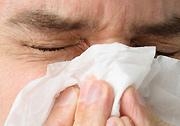Unmasked and vulnerable
Donning a mask boosts protection from respiratory illnesses such as influenza, UNSW research has found, but convincing a reluctant public is proving a struggle.
Donning a mask boosts protection from respiratory illnesses such as influenza, UNSW research has found, but convincing a reluctant public is proving a struggle.

Donning a face mask is an easy way to boost protection from respiratory illnesses such as influenza and the common cold, new research from the University of New South Wales (UNSW) has found, but convincing a reluctant public and health workers is proving a struggle.
In a world-first clinical trial of the efficacy of masks, researchers found adult mask wearers* in the home were four times more likely than non-wearers to be protected against respiratory viruses, including the common cold.
The findings - published this week in Emerging Infectious Diseases, the journal of the US Centres for Disease Control and Prevention - have global implications and are particularly relevant to efforts to combat the spread of flu pandemics and other emerging respiratory diseases such as SARS.
"In the event of a severe pandemic, demand for protection could become a law and order issue," said lead author of the paper, Raina MacIntyre, who is Professor of Infectious Diseases Epidemiology and head of UNSW's School of Public Health and Community Medicine.
"In a crisis, vaccine development is likely to be delayed and drugs may be in short supply or not available at all," she said.
While some governments are already stockpiling masks for use in emergencies, Professor MacIntyre said these guidelines had been implemented without evidence to support them.
"We now have provided that evidence. Masks play an important role in reducing transmission if they are worn properly."
At a day-to-day level, the study is also good news for parents of toddlers and young children.
"There is no effective treatment for the 90 or so common cold viruses that make families sick each winter, but masks could provide simple and effective protection," Professor MacIntyre said.
Commissioned and funded by the Australian Department of Health and Ageing in response to an urgent policy need, the study is the first randomised controlled clinical trial of masks to be conducted internationally.
Professor MacIntyre said a drawback was participants' low compliance, with fewer than half reporting having worn the masks often or always. However, adherence to preventative measures is known to vary depending on perception of risk and would be expected to increase during a pandemic.
The next pressing research question is the value of the use of masks among health care workers. Preliminary work in Australia in 2007 showed very low acceptance of and compliance with mask use by hospital doctors and nurses.
*both surgical and non-fit-tested P2 masks.
Media Contact: Steve Offner, UNSW Media Office | 02 9385 8107 or 0424 580 208 | s.offner@unsw.edu.au